2017年牛津译林版初中英语八年级下英语Unit5 Good manners检测题(含答案)
- 格式:doc
- 大小:172.50 KB
- 文档页数:7


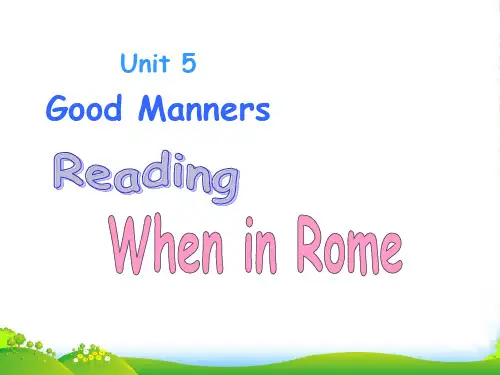
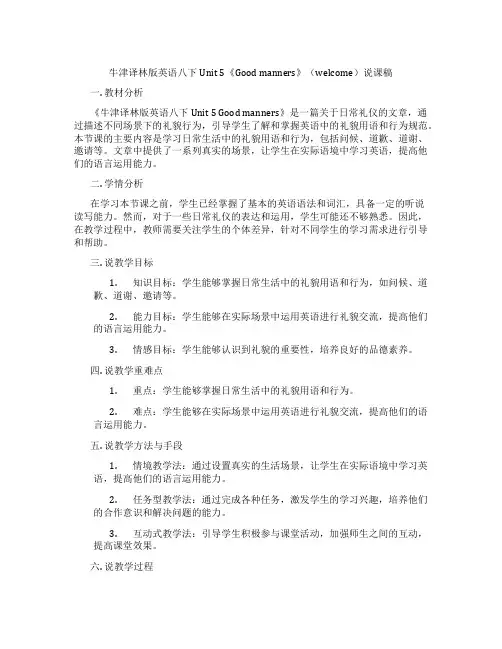
牛津译林版英语八下Unit 5《Good manners》(welcome)说课稿一. 教材分析《牛津译林版英语八下Unit 5 Good manners》是一篇关于日常礼仪的文章,通过描述不同场景下的礼貌行为,引导学生了解和掌握英语中的礼貌用语和行为规范。
本节课的主要内容是学习日常生活中的礼貌用语和行为,包括问候、道歉、道谢、邀请等。
文章中提供了一系列真实的场景,让学生在实际语境中学习英语,提高他们的语言运用能力。
二. 学情分析在学习本节课之前,学生已经掌握了基本的英语语法和词汇,具备一定的听说读写能力。
然而,对于一些日常礼仪的表达和运用,学生可能还不够熟悉。
因此,在教学过程中,教师需要关注学生的个体差异,针对不同学生的学习需求进行引导和帮助。
三. 说教学目标1.知识目标:学生能够掌握日常生活中的礼貌用语和行为,如问候、道歉、道谢、邀请等。
2.能力目标:学生能够在实际场景中运用英语进行礼貌交流,提高他们的语言运用能力。
3.情感目标:学生能够认识到礼貌的重要性,培养良好的品德素养。
四. 说教学重难点1.重点:学生能够掌握日常生活中的礼貌用语和行为。
2.难点:学生能够在实际场景中运用英语进行礼貌交流,提高他们的语言运用能力。
五. 说教学方法与手段1.情境教学法:通过设置真实的生活场景,让学生在实际语境中学习英语,提高他们的语言运用能力。
2.任务型教学法:通过完成各种任务,激发学生的学习兴趣,培养他们的合作意识和解决问题的能力。
3.互动式教学法:引导学生积极参与课堂活动,加强师生之间的互动,提高课堂效果。
六. 说教学过程1.导入:教师通过与学生互动,引导学生谈论日常生活中的礼貌行为,激发学生的学习兴趣。
2.新课展示:教师展示文章,引导学生阅读,理解文章内容。
3.课堂讲解:教师讲解文章中的重点词汇和语法,帮助学生理解和掌握。
4.实践环节:教师设置真实的生活场景,让学生分组进行角色扮演,实际运用英语进行礼貌交流。
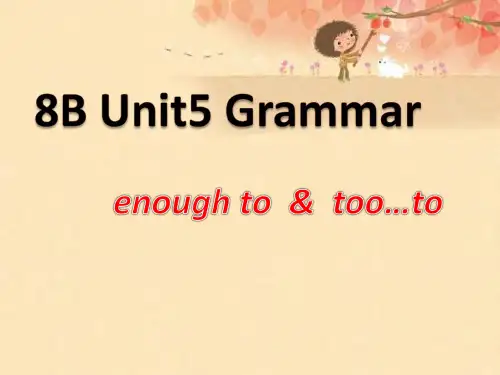
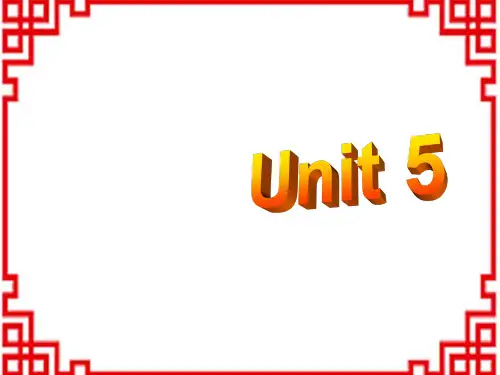
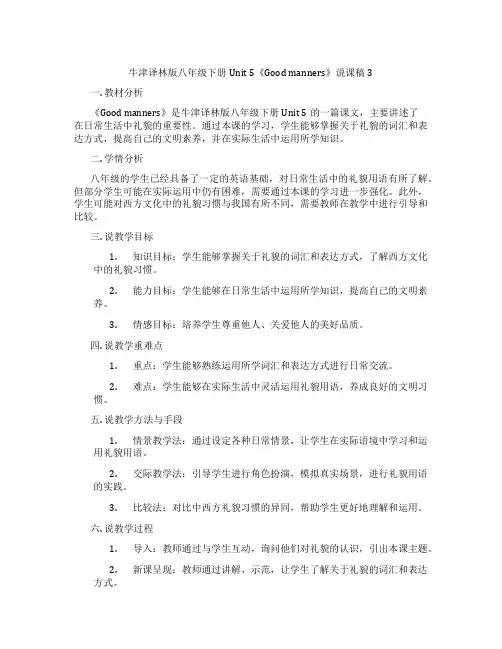
牛津译林版八年级下册Unit 5《Good manners》说课稿3一. 教材分析《Good manners》是牛津译林版八年级下册Unit 5的一篇课文,主要讲述了在日常生活中礼貌的重要性。
通过本课的学习,学生能够掌握关于礼貌的词汇和表达方式,提高自己的文明素养,并在实际生活中运用所学知识。
二. 学情分析八年级的学生已经具备了一定的英语基础,对日常生活中的礼貌用语有所了解。
但部分学生可能在实际运用中仍有困难,需要通过本课的学习进一步强化。
此外,学生可能对西方文化中的礼貌习惯与我国有所不同,需要教师在教学中进行引导和比较。
三. 说教学目标1.知识目标:学生能够掌握关于礼貌的词汇和表达方式,了解西方文化中的礼貌习惯。
2.能力目标:学生能够在日常生活中运用所学知识,提高自己的文明素养。
3.情感目标:培养学生尊重他人、关爱他人的美好品质。
四. 说教学重难点1.重点:学生能够熟练运用所学词汇和表达方式进行日常交流。
2.难点:学生能够在实际生活中灵活运用礼貌用语,养成良好的文明习惯。
五. 说教学方法与手段1.情景教学法:通过设定各种日常情景,让学生在实际语境中学习和运用礼貌用语。
2.交际教学法:引导学生进行角色扮演,模拟真实场景,进行礼貌用语的实践。
3.比较法:对比中西方礼貌习惯的异同,帮助学生更好地理解和运用。
六. 说教学过程1.导入:教师通过与学生互动,询问他们对礼貌的认识,引出本课主题。
2.新课呈现:教师通过讲解、示范,让学生了解关于礼貌的词汇和表达方式。
3.实践环节:学生进行角色扮演,模拟真实场景,运用所学礼貌用语进行交流。
4.小组讨论:学生分组讨论,对比中西方礼貌习惯的异同,分享自己的看法。
5.总结提升:教师对学生的表现进行点评,引导学生认识到礼貌在日常生活中的重要性。
6.作业布置:学生课后运用所学知识,编写一个小短剧,展示文明礼貌的重要性。
七. 说板书设计板书设计采用思维导图的形式,将本课的主要知识点进行梳理,便于学生复习和巩固。
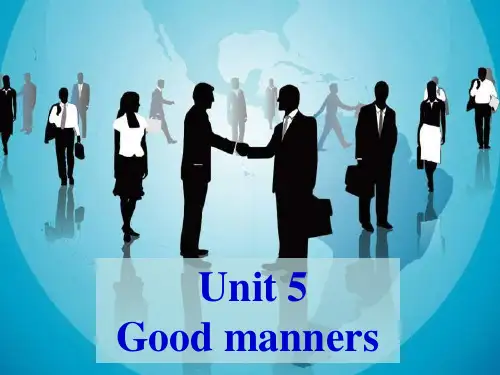
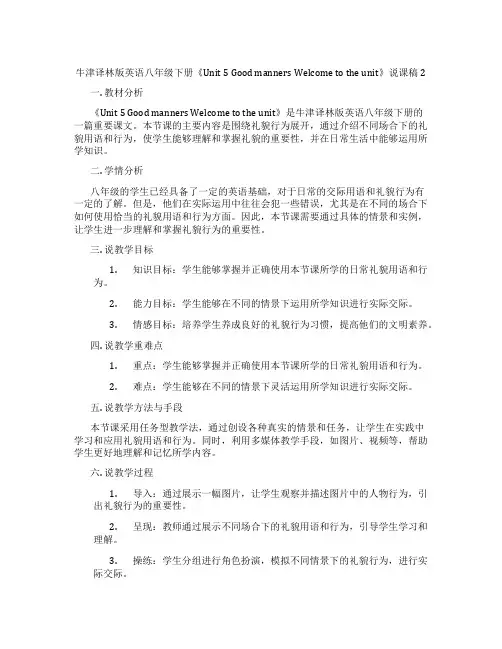
牛津译林版英语八年级下册《Unit 5 Good manners Welcome to the unit》说课稿2一. 教材分析《Unit 5 Good manners Welcome to the unit》是牛津译林版英语八年级下册的一篇重要课文。
本节课的主要内容是围绕礼貌行为展开,通过介绍不同场合下的礼貌用语和行为,使学生能够理解和掌握礼貌的重要性,并在日常生活中能够运用所学知识。
二. 学情分析八年级的学生已经具备了一定的英语基础,对于日常的交际用语和礼貌行为有一定的了解。
但是,他们在实际运用中往往会犯一些错误,尤其是在不同的场合下如何使用恰当的礼貌用语和行为方面。
因此,本节课需要通过具体的情景和实例,让学生进一步理解和掌握礼貌行为的重要性。
三. 说教学目标1.知识目标:学生能够掌握并正确使用本节课所学的日常礼貌用语和行为。
2.能力目标:学生能够在不同的情景下运用所学知识进行实际交际。
3.情感目标:培养学生养成良好的礼貌行为习惯,提高他们的文明素养。
四. 说教学重难点1.重点:学生能够掌握并正确使用本节课所学的日常礼貌用语和行为。
2.难点:学生能够在不同的情景下灵活运用所学知识进行实际交际。
五. 说教学方法与手段本节课采用任务型教学法,通过创设各种真实的情景和任务,让学生在实践中学习和应用礼貌用语和行为。
同时,利用多媒体教学手段,如图片、视频等,帮助学生更好地理解和记忆所学内容。
六. 说教学过程1.导入:通过展示一幅图片,让学生观察并描述图片中的人物行为,引出礼貌行为的重要性。
2.呈现:教师通过展示不同场合下的礼貌用语和行为,引导学生学习和理解。
3.操练:学生分组进行角色扮演,模拟不同情景下的礼貌行为,进行实际交际。
4.巩固:教师提供一些实际情景,让学生进行小组讨论,并选择正确的礼貌用语和行为。
5.拓展:学生分组进行编写对话,讨论如何在日常生活中运用礼貌行为,并进行展示。
6.总结:教师对本节课所学内容进行总结,强调礼貌行为的重要性。
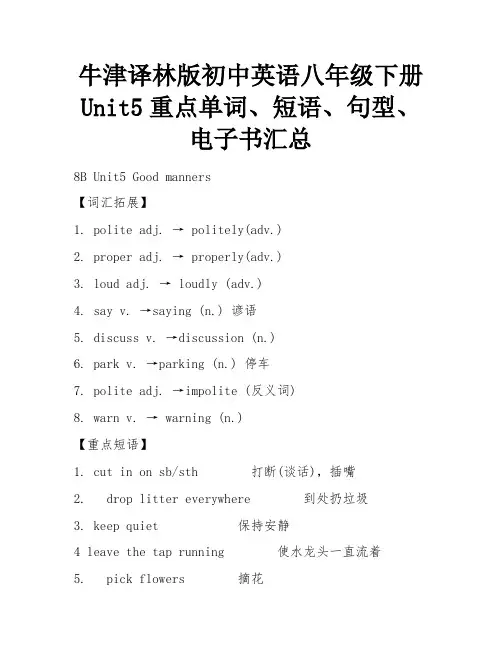
牛津译林版初中英语八年级下册Unit5重点单词、短语、句型、电子书汇总8B Unit5 Good manners【词汇拓展】1. polite adj. → politely(adv.)2. proper adj. → properly(adv.)3. loud adj. → loudly (adv.)4. say v. →saying (n.) 谚语5. discuss v. →discussion (n.)6. park v. →parking (n.) 停车7. polite adj. →impolite (反义词)8. warn v. → warning (n.)【重点短语】1. cut in on sb/sth 打断(谈话),插嘴2. drop litter everywhere 到处扔垃圾3. keep quiet 保持安静4 leave the tap running 使水龙头一直流着5. pick flowers 摘花6. obey traffic rules 遵守交通规则7. invite sb to do sth 邀请某人做某事8. keep the library clean 保持图书馆干净9. the proper way to do sth 做某事的恰当方式10. say hello to sb 向某人问好11. for the first time 第一次12. talk about 谈论13. in public 在公共场合14. laugh loudly 大声地笑15. by accident 偶然地,意外地16. greet each other 互相问候17. any time 任何时候;随时18. on one's own 单独19. join the discussion 加入到讨论中20. express oneself clearly 清楚地表达自己21. write down 写下,记下22. be busy with/doing sth 忙于(做)某事23. warn sb of sth 警告某人某事24. keep sb away from danger 使某人远离危险25. no smoking 禁止吸烟26. soon after 不久以后27. in order to 为了28.make one's dream e true 使某人的梦想成为现实29. practise doing sth 练习做某事30. the purpose of ……的目的31.above all 首要的是32. in one's way挡住某人的路【重点句子】1.霍波,你已经够大了,所以你应该学点礼貌。
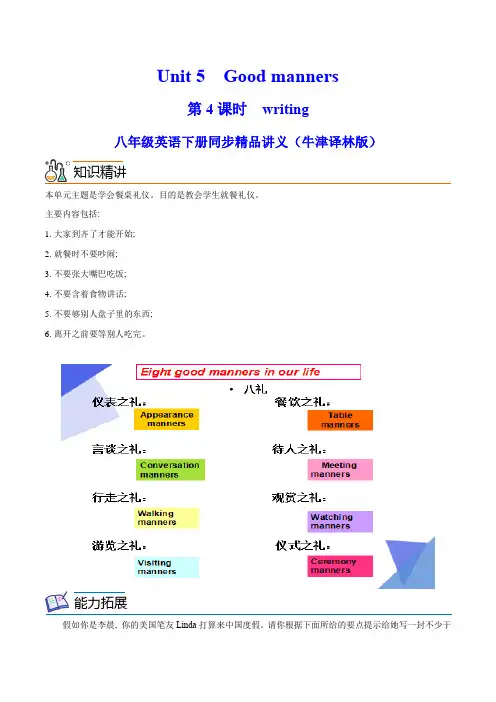
Unit 5 Good manners第4课时 writing八年级英语下册同步精品讲义(牛津译林版)本单元主题是学会餐桌礼仪。
目的是教会学生就餐礼仪。
主要内容包括:1. 大家到齐了才能开始;2. 就餐时不要吵闹;3. 不要张大嘴巴吃饭;4. 不要含着食物讲话;5. 不要够别人盘子里的东西;6. 离开之前要等别人吃完。
假如你是李晨, 你的美国笔友Linda 打算来中国度假。
请你根据下面所给的要点提示给她写一封不少于知识精讲能力拓展80词的电子邮件, 简单介绍一下中国的风俗与餐桌礼仪。
要点提示:1. 赴宴要准时, 见面要微笑、握手。
2. 每次不要吃太多。
3. 当你吃饱了, 对主人的劝菜应礼貌回绝。
4. 告辞时, 要对主人表示感谢。
思路点拨本单元主要向别人介绍餐桌礼仪, 要从以下三个方面人手:A) 赴宴要准时, 见面要微笑、握手。
B) 不要吃得太多, 吃饱了对主人的劝菜应礼貌回绝。
C) 告辞时, 要对主人表示感谢。
____________________________________________________________________________________________ ____________________________________________________________________________________________ ____________________________________________________________________________________________ ____________________________________________________________________________________________ ____________________________________________________________________________________________ ____________________________________________________________________________________________ ____________________________________________________________________________________________【答案】Dear Linda,I’m glad to hear that you will e to my country for vacation. Different countries have different customs and table manners. In China, if you’re invited to dinner, you re supposed to be on time and shake hands with the host with a smile. While eating, you should not eat too much at a time. It’s good manners to chew with your mouth closed and use a napkin to wipe your mouth sometimes. When you are full but the host still asks you to help yourself to some more food, you should say “Thank you.It’s delicious, but I’m full.” It’s polite to say thanks while leaving. Have a good trip!Yours,Li Chen分层提分A今年是我市创建全国文明城市的关键一年。
8B Unit 5 单词知识点讲义1.manners n.(复)礼貌,礼仪;规矩good/bad manners 有/没有礼貌have manners 有礼貌have no manners 没礼貌It’s good manners to keep quiet in the library.在图书馆保持安静是有礼貌的。
show good manners to sb 对某人有礼貌2.cut in (on sb/sth)打断,插嘴Don’t cut in on others. 不要打断别人。
cut in 插队3. im polite adj. 不礼貌的impolite ly polite有礼貌的---politely adv.有礼貌地be polite / impolite to…..It’s impolite to shout at others.对别人大叫是不礼貌的。
We should speak to the old politely.我们应该有礼貌地对老人说话。
4. litter n. 垃圾,杂物rubbishdrop litter everywhere 到处扔垃圾drop litter carelessly 随意扔垃圾a lot of litter 许多垃圾5. tap n.水龙头;旋塞turn on/off the tap 打开/关水龙头6. run v.流动leave the tap running 让水龙头的水流淌7. pick vt.采,摘pick apples/cotton 摘苹果/棉花pick vt. 挑选pick another citypick up捡起;pick out挑选出8. obey vt. & vi. 遵守,顺从obey traffic rules 遵守交通规则obey orders 服从命令9. queue vi. 排队等候queue at the school gate 在校门口排队等候queue up for a bus 排队等汽车queue n.行列,长队wait/stand in a queue排队等候10. turn n. 轮流,顺序queue for your turn 排队等轮到你wait your turn等轮到你take turns to do sth 轮流做某事It’s one’s turn to do sth轮到----做It’s my turn to clean the blackboard.轮到我擦黑板。
牛津译林英语8年级下册Unit5 语法专题五:enough...to & too...to语法知识梳理:考点一:enough...to 的用法考向一:sb.+ be +(not) adj. + enough + to do sth. 某人足够/不够...做某事Eg. The boy is strong enough to swim across the wide river.这男孩足够的强壮,能游过这条宽阔的河。
They should be kind enough to help friends any time.考向二:1)enough 置于形容词之后。
在使用本句型的时候,要注意主语和be 动词的一致性。
而且形容词前没有任何诸如very, quite等之类的修饰词。
Eg. The room is big enough to hold all of us. 这房间足够大,能容纳我们所有人。
2)该句型可以和so....that句型互换。
Eg. He is clever enough to work out the problem easily. 他足够聪明,能很容易地解出这道题。
= He is so clever that he can work out the problem easily.考点二:too...to的用法考向一:too...to中too后接形容词或副词Eg. I like this bike, but it’s too expensive for me to buy. What a pity!我喜欢这辆自行车,但是买它对我来说太贵了。
太遗憾了!考向二:1)too...to句式可与so...that以及not...enough to...句型中的形容词或副词意思相反。
Kimi was too tired to walk. =Kimi is so tired that he couldn’t walk.He is too young to look after himself. =He is not old enough to look after himself.2)在too...to句式中,句子的主语和不定式的宾语是指同一个事物,则宾语不能重复,必须省掉,有时甚至其后的to do也可以省去。
牛津译林版英语八年级下册《Unit 5 Good manners Welcome to the unit》教学设计2一. 教材分析本课选自牛津译林版英语八年级下册Unit 5 Good manners Welcome to the unit 部分。
本节课主要讨论礼仪和行为规范,通过学习让学生掌握日常生活中的基本礼仪,培养他们的跨文化交际意识。
教材内容丰富,包括听力、阅读、口语和写作等多个方面,有利于全面提高学生的英语综合运用能力。
二. 学情分析八年级的学生已经具备一定的英语基础,对日常生活中的礼仪和行为规范有一定的了解。
但部分学生可能对一些细节性的礼仪知识掌握不够,需要通过本节课的学习进行巩固和提高。
此外,学生应该具备基本的听力、口语、阅读和写作能力,能够参与到课堂活动中。
三. 教学目标1.知识目标:–能够听懂、会说、会读、会写本节课的生词和重点句子。
–掌握日常生活中的基本礼仪和行为规范。
2.能力目标:–能够运用所学知识进行日常交流,提高跨文化交际意识。
–能够独立完成听力、阅读、口语和写作任务。
3.情感目标:–培养学生的合作意识,提高他们的自信心。
–使学生认识到礼仪和行为规范在生活中的重要性,培养良好的行为习惯。
四. 教学重难点•掌握本节课的生词和重点句子。
•了解日常生活中的基本礼仪和行为规范。
•运用所学知识进行实际交流,特别是在跨文化交际中。
•对于部分学生来说,听力理解和阅读理解可能存在困难。
五. 教学方法1.任务型教学法:通过完成各种任务,让学生在实践中掌握知识。
2.交际型教学法:通过角色扮演、小组讨论等形式,提高学生的交际能力。
3.情境教学法:创设各种生活情境,让学生在真实的环境中学习英语。
六. 教学准备1.教材、录音机、投影仪等教学设备。
2.与本节课相关的图片、视频等教学资源。
3.准备听力、阅读、口语和写作任务的相关材料。
七. 教学过程1.导入(5分钟)通过展示一些日常礼仪的图片,引导学生谈论礼仪和行为规范,激发学生的学习兴趣。
牛津英语8B Unit 5 Good manners 课文要点全解重点单词1.manners n.(复)礼貌,礼仪;规矩good/bad manners 有/没有礼貌/have manners 有礼貌/have no manners 没礼貌show good manners to sb 对某人有礼貌2. litter n. 垃圾,杂物rubbishdrop litter everywhere 到处扔垃圾/drop litter carelessly 随意扔垃圾a lot of litter 许多垃圾3. pick vt.采,摘pick apples/cotton 摘苹果/棉花/pick vt. 挑选pick another citypick up捡起;pick out挑选出4. turn n. 轮流,顺序queue for your turn 排队等轮到你/wait your turn等轮到你take turns to do sth 轮流做某事It’s one’s turn to do sth轮到----做turn down关小turn up开大/出现turn on打开turn off关(水源、煤气、电灯等)turn in上交turn...into...(使……)成为……5. proper (right or correct) adj.符合习惯的;正确的/improper 不正确的,不恰当的/properly adv. 正确地6. greet(say hello to sb. or welcome them) vt. 问候,打招呼问候某人greet sbgreet sb. with sth.以……跟某人打招呼greet ing n.say greetings to sb7. close adj.亲密的,严密的,靠近的;adv. 靠近地a close friend 一个亲密的朋友;/a close paper 一张严密的试卷be close to sp.= be near sp. 靠近某地★close v. 关上;closed adj.关闭的8. conversation (a small talk) n. (非正式)交谈,谈话have a conversation with sb. 与某人谈话start a conversation with ….以……开始谈话9. avoid (try not to do sth.) vt.避免/avoid doing sth. 避免做某事10. behave vi.& vt.表现behave well 表现好;behave badly 表现差behaviour /behavior n.(不可数,行为,举止)11. public n. 民众,群体;adj. 公共的,公众的public telephone/ sign/ toilet/ library公共电话/标识/公测/图书馆★in public当众;公开地,在别人面前12. in one’s way挡住某人的路by the way 顺便问一下;on the way在途中;make one’s way前进;lose one’s way迷路13. touch vt.触摸, 碰, 感动n. 联系Don’t touch the paint until it’s dry. 油漆未干,请勿触摸。
2017年牛津译林版初中英语八年级下英语Unit5 Good manners检测题含答案一、单项选择(25分)( )1. There is a big stone_______ my way_______ my way home yesterday.A. at; byB. in; byC. on; inD. in; on( )2. He had to speak in a loud_______ because of the_______ of the party in the next room.A. noise; noiseB. voice; soundC. voice; noiseD. sound; voice( ) 3. Hard work can bring you_______, but if you are lazy, you won't become_______.A. success; successfulB. successful; successfulC. successful; successD. success; success( ) 4. Sailing on a snowy day means_______ in the sea,A. to risk losing lifeB. risking losing lifeC. to risk to lose lifeD. risking to lose life( ) 5. ---He's already been back from Australia, _______? ----_______. He is on a visit to Shanghai.A. isn't he; NoB. hasn't he; YesC. isn't he; YesD. hasn't he; No( ) 6. This exercise is_______ difficult_______.A. so; that few of us can doB. so; that many of us can doC. too; for any one of us to doD. too; for any one of us to do it( ) 7. ---Where is your mother? ---She_______ Shanghai. She won't come back_______ next week.A. has gone to; untilB. has been to; untilC. has been to; afterD. has gone to; after( ) 8. Mike is learning _______ a computer.A. what to useB. how to useC. how he useD. how to using( )9. Anna dances_______, if not better than, Lily.A. so wellB. as well asC. so well asD. as well( )10. The book isn't mine. _______ can it be?A. What elseB. Who elseC. Which else'sD. Who else's( )11. The tent is_______ for a family of three __________.A. big enough; to loveB. enough big; to live in itC. big enough; to live inD. enough big; live in ( ) 12. --- Would you please not speak so loudly in public?--- Sorry. I will remember to speak in lower voice.A. the; aB. /; aC. the; theD. /; /( ) 13. The of new inventions should be to make life easier, not to make it harder.A. rulesB. subjectsC. secretsD. purposes( ) 14. I have spent on this job. I think I can finish it this afternoon.A. sometime; sometimeB. sometimes; some timeC. some time; sometimeD. some times; some time ( ) 15. —Boy, didn’t you see people were waiting in line? Don’t in! — I am sorry, sir.A. pushB. pullC. putD. carry( ) 16. Jim always keeps the tap running he finishes washing his face.A. sinceB. whileC. asD. till( )17. You’d better fix the machine I have told you. Otherwise, you may make more problems.A. likeB. withC. asD. follow( )18. --- Mum, can you give me some advice on how to behave myself at the table?---Well, I do have some advice. _________, please keep quiet while eating.A. In allB. Of allC. At allD. Above all( )19. --- Do you think the question too hard _________? ---I don’t think so. He can a nswer it easily.A. of Jim to answerB. of Jim to answer itC. for Jim to answerD. for Jim to answer it ( )20. --- Mrs Green. Do you think I can get an “A” in the final exam if I start working hard now?--- Of course. ____________.A. Better late than neverB. Many hands make light workC. You cannot burn the candle at both sidesD. Actions speak louder than words( )21. ---Mum, I want to have some milk. ---There is none ___. What about orange juice?A. haveB. leavingC. leftD. leaves( )22. Your advice will help me my English.A. affordB. cureC. improveD. affect( )23. Seeing believing.A. beB. areC. wasD. is( )24. ---Do you spend a lot of time computer?---No, but I spend much time doing my homework.A. on; inB. in; onC. on; onD. in; in( )25. ---Is your father a teacher? ---Well, he _______.A. used toB. was used toC. used to beD. is used to be二、完形填空(10分)Pearl necklaces (珍珠项链) are very beautiful. Can you believe that these shining pearls__1 a kind of little animal named oyster(牡蛎)? The animal lives in a shell (壳), deep down at the bottom 2 the sea. 3 do these beautiful pearls form (形成) inside an oyster? A grain (颗粒) of sand enters an oyster’s shell. This makes the oyster __4 . Just as 5 some dust enters your eyes, your eyes will water and the tears (眼泪) from your eyes will try to 6 out the dust!But when a grain of sand enters an oyster’s shell, it can’t wash it out.7 , the oyster’s body keeps building a white 8 “coat” around the annoying sand. The coat covers the sand and9 that makes a pearl.Today people raise pearls on a pearl farm. They 10 the oysters’ shells softly and place some sand inside them. When a pearl is made, people get it out again.( )1. A. turn into B. take in C. get married D. come from( )2. A. for B. of C. on D. over( )3. A. How B. Where C. Why D. What( )4. A. happy B. shy C. upset D. silly( )5. A. before B. when C. unless D. though( )6. A. wash B. come C. pull D. throw( )7. A. Inside B. Perhaps C. Instead D. Besides( )8. A. dirty B. serious C. shining D. dangerous( )9. A. typically B. recently C. suddenly D. finally( )10. A. break B. open C. save D. protect三、阅读理解(30分)ALiving in a foreign country can be exciting, but it can also be confusing (令人迷惑的).A group of Americans who taught English in other countries recently discussed their experiences. They decided that miscommunications were always possible, even over something as sim ple as “yes” and “no”. On her first day in Micronesia, an island in the Pacific, Lisa thought people weren’t paying any attention to her. The day was hot. She went into a store and asked, “Do you have cold drinks?”The woman there didn’t say anything. Lisa repeated the question. Still the woman said nothing. She later learned that the woman had answered her: She had raised her eyebrows (眉毛), which in Micronesia means“yes”. Jan remembered an experience she had in Bulgaria, a country in Europe. She went to a restaurant that was known for its cabbage. She asked the waiter, “Do you have cabbage today?” He nodded his head. Jan waited, but the cabbage never came. In that country, a nod means “no”. Tom had a similar problem when he arrived in India. After explaining something in class, he asked his students if they understood. They answered with many different nods and shakes of the head. He thought some students had not understood, so he explained again. When he asked again, they did the same thing. He soon found out that his students did understand. In India, people nod and shake their heads in different ways depending on where they come from. You have to know where a person is from to understand whether they mean “yes”or “no”.( )1. These Americans teaching English in other countries found that they _________.A. should go abroad for vacationsB. needed to learn foreign languagesC. should often discuss their experiencesD. had problems with communications( )2. People in Micron show “yes” by _________.A. nodding headsB. raising eyebrowsC. shaking headsD. saying “no”( )3. Tom misunderstood his class at first because_________.A. he did not know much about Indian cultureB. he didn’t explain everything clearly enoughC. some students didn’t un derstand his questionsD. he didn’t know where the students came from ( )4. Which of the following is TRUE according to this passage?A. In Bulgaria, nodding heads means “no”.B. Jan taught English on a Pacific island.C. Lisa was trying to buy some cabbage.D. I n India, only shaking heads means “yes”. ( )5. The passage is mainly about_________.A. body language in foreign restaurantsB. class discussion in Indian schoolsC. miscommunication in different culturesD. English teaching in other countriesBIn America, just as in Europe, men usually open doors for women, and women always walk ahead of men into a room or a restaurant, unless(除非) the men have to be ahead of the ladies to choose the table, to open the door of a car or do some other things like the above. On the street, men almost always walk or cross the street on the closer side of the ladies to the traffic. But if a man walks with two ladies, he should walk between them. Then if the host (男主人) or hostess(女主人) or both of them come in a car to get their guest for dinner, the guest should sit at the front seat and leave the back seat though there is no people sitting on it.( )6. In America men usually __________.A. walk ahead of womenB. eat in a restaurantC. walk behind womenD. drive a car to work ( )7. In the street men __________.A. cross the streetB. walk on the right side of the ladiesC. walk on the closer side of the ladies to the trafficD. walk near the ladies( )8. If a man walks with two ladies, he should __________.A. walk between themB. run before themC. follow themD. go away( )9. If Mrs. Green wants you to her house in a car, you should __________.A. sit beside a guestB. sit at the front seatC. sit at the back seatD. drive the car( )10. Which is the best title for the passage? __________A. To be a good mannerB. Men should walk after ladiesC. Men should help womenD. Sit by LadiesCIt’s Sunday. There are many people in the bus. And an old man is looking here and there. He wants to find an empty seat. Then he finds one. He goes to it. A small bag is on the seat. And a young man is sitting beside it. “Is this seat empty?” asks the old man.“No, it’s for a woman. She goes to buy some bananas.” Says the young man.“Well,” says the old man, “Let me sit here please. When she comes back, I will leave here.” The bus starts. “She doesn’t come, but her bag is here. Let me give her the bag.” Then the old man throws the bag out of the bus window. The young man jumps up and shouts, “Don’t throw! It’s my bag!”( )11. The old man wants to find an empty seat ________.A. in the roomB. in the busC. beside the driverD. in a car( )12. The old man finds an empty seat. He goes there and finds there is ________ on it.A. a manB. womanC. a bagD. a coat( )13. The young man says the seat is for _________.A. a manB. a womanC. a boyD. a girl( )14. The bus starts. The old man _________.A. asks the woman to sit on the seatB. takes the bag to the womanC. throws the bag to the young manD. throws the bag out of the window( )15. The bag is _________. The young man doesn’t want the old man to throw it away.A. the woman’sB. the old man’sC. the driver’sD. the young man’s四、词汇、短语和语法(20分)A)根据句意和汉语注释,写出单词的正确形式(每空1分,共7分)。